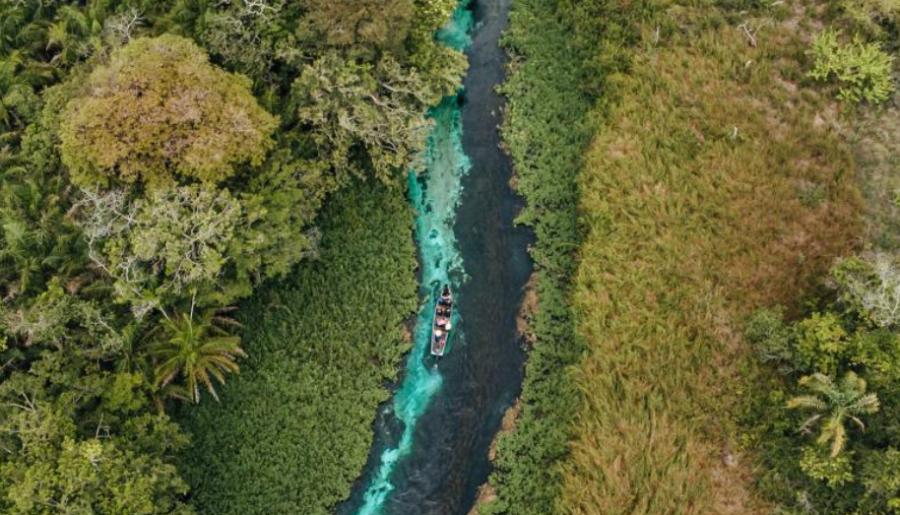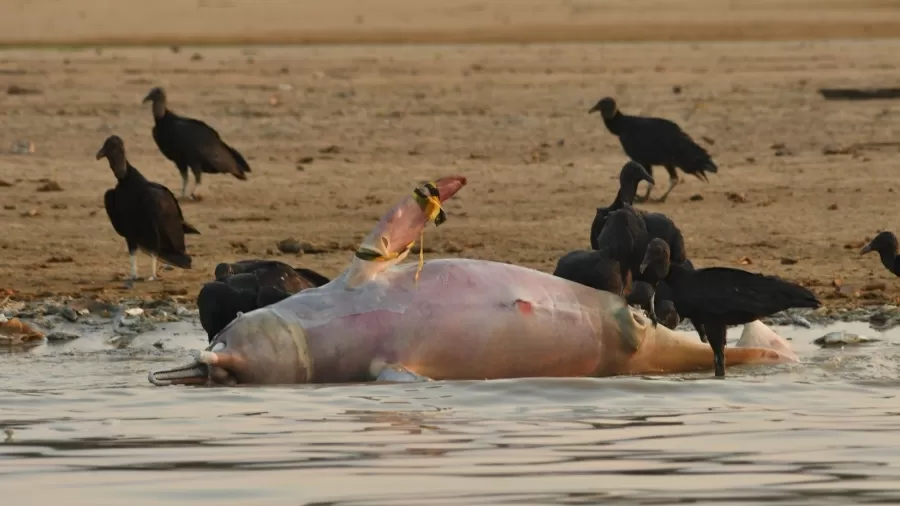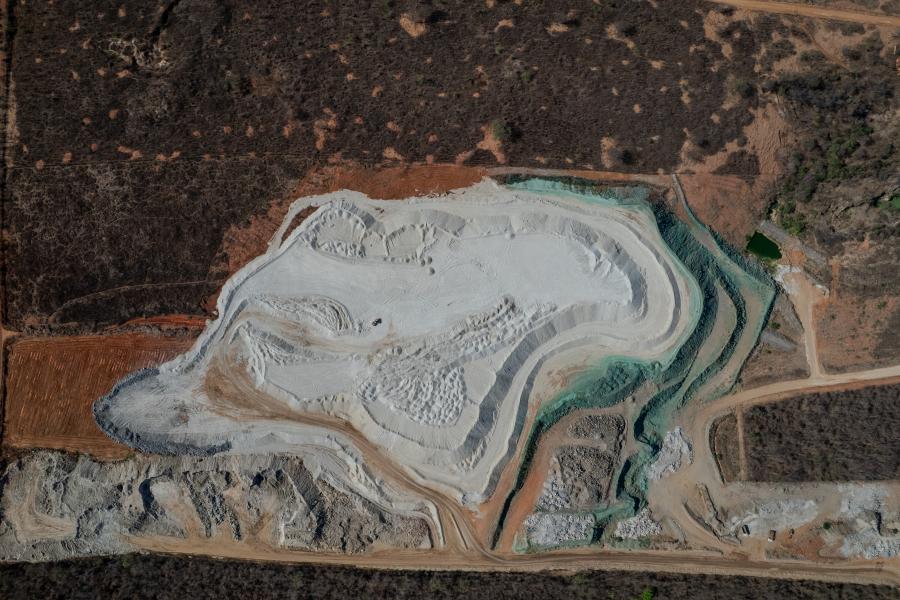The Pataxó of Bahia: Persecution and Discrimination Continue
In the 1940s remnants of the three Indian groups that had gradually been compelled to abandon their ancestral lands had moved to the area occupied by the Pataxó Hahahai Indians in the basin of the Pardo and Colonia rivers in southeastern Bahia, Brazil. As a result of living together, these different groups have now become Pataxó Hahahai. This ethnic identity is now generally recognized by the entire indigenous population.
The history of the colonization of Bahia's southern region is a tragic history of tremendous violence exerted against the Indian inhabitants. White invaders attacked with firearms indigenous bands equipped only with primitive weapons. Through their intimate knowledge of the region, however, the Indians succeeded in resisting by retreating into the jungle, where they sought shelter and where their prosecutors dared not follow. During the latter half of the nineteenth and first decades of the twentieth century, Indian hunting because a profession in southern Bahia. Hired gunmen were often employed to kill Indians and clear the way for the establishment of great cacao plantations. The difficulties of the pursuit, however, soon caused the invaders to adopt new strategies: poisoning watering places, leaving smallpox-infected clothes in Indian areas, setting traps and so on.
The installation of the Service for the Protection of Indians (SPI) posts did not end the violence. In 1936, pretending that a communist revolution was to begin there, the Bahian military police invaded the Paraguaçu - Caramuru Reservation, shooting, beating and torturing the men and violating the women.
Soon after, SPI and Bahia's state government negotiated the reduction of the area of the reservation to 36,000 ha. SPI soon adopted the policy of renting much of this land to white ranchers, so that the Pataxó were called upon to work in their own lands as employees or were driven away by threat, force, the burning of their crops, imprisonment or murder. SPI and later FUNAI sometimes collaborated with local landowners by arresting Indian leaders; the "rebels" were sent to a rehabilitation center maintained by FUNAI in the state of Minas Gerais. At that time, many Pataxó emigrated to live as refugees in the so-called "Guaraní Farm," a FUNAI settlement also in Minas Gerais.
Owing to the almost total occupation of the Paraguaçu - Caramuru Reservation by ranchers and the dispersal of many of the Indians who had lived there, FUNAI deactivated the Indian posts in 1972 and ceased to charge rents from the leaseholders. The ranchers demanded that the land be turned over to them. In 1976 FUNAI decided to sponsor a survey of the area and to demarcate Indian lands. A firm was contracted to do the job, but the ranchers prevented the demarcation of the even further-reduced area by threatening the lives of the surveyors.
Since the adoption of the Indian Statute in 1973, which expressly forbids leasing contracts with non-Indians for the exploitation of the resources of Indian lands, the ranchers settled in the Paraguaçu-Caramuru Reservation have attempted to "legalize" their land usurpations. From 1976 to 1980, Bahia's governors Magalhaes and Santos illegally distributed titles to the land to the ranchers.
The Pataxó, however, never renounced their territory and never acknowledged the "rights" of the newly created landowners to dispossess them. In 1982 the Indians of the Paraguaçu-Caramuru Reservation who had been living as refugees on the Fazenda Guaraní in Minas Gerais decided to return to their lands and reoccupied a tract on which a well-known land grabber named Jenner Pereira Rocha had created a ranch, Fazenda Sao Lucas.
Since that time pressures to evict the Indians have been brought to bear on various authorities. FUNAI, having exhausted the possibilities of a negotiated solution, brought a suit against the ranchers to invalidate the titles the Bahia's state government had distributed to them. The ranchers did not wait passively for the decision from Brazil's Supreme Court. Using political influence, the ranchers convinced Bahia's state government and local FUNAI officials to try to relocate the Indians to various inhospitable sites. A group of 325 Pataxó was moved to a government experimental station on which such large numbers of Indians could not be housed even temporarily. The Pataxó who remained at Sao Lucas went to court to demand a restraining order against further relocation. The federal judge ruled in their favor and issued an order restraining further transfers and ordering the return of the Almada group. When the Pataxó were to return, a band of armed ranchers prepared to meet and kill them, but they were avoided and the move was made successfully at dawn.
Frustrated by their inability to evict the Pataxó, the ranchers decided to intensify their violence. In 1984 the Pataxó Indian Antonio Julio da Silva was wounded in the head by a rifle shot coming from Fazenda Paraiso, a ranch adjacent to Fazenda Sao Lucas. A month later, two FUNAI functionaries were almost killed by hired gunmen when they were returning from testifying about the shooting incident.
The Pataxó Hahahai have been continually besieged ever since and have suffered threats, affronts, challenges and aggressions of hired thugs. Meanwhile life in Sao Lucas has become harder. Ranchers have refused to allow Indians to travel to nearby towns to purchase food and necessities or even water during the dry season. In three years, from 1982 to 1985, 29 children died. In spite of all their hardships, the Pataxó have stood fast. So, the ranchers' violence increased again.
On 30 March 1988, hired assassins attacked the Indians at Sao Lucas. After the raid a Pataxó, Djalma Lima Pataxó, disappeared. Nine days later, his corpse was discovered with undeniable signs of torture: the scalp was removed, nails torn away and tongue and testicles cut off. Nevertheless, the federal police have let the investigation stagnate. No other authorities have expressed concern about the incident.
Indians, indigenists, anthropologists and members of the National Association for Indian Support in Bahia are certain that the failure to find and prosecute the assassin(s) will increase hostilities and aggressions and eventually lead to the massacre of other Pataxó Hahahai.
Article copyright Cultural Survival, Inc.



